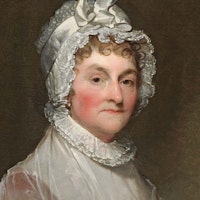Great necessities call out great virtues. When a mind is raised and animated by scenes that engage the heart, then those qualities which would otherwise lay dormant wake into life and form the character of the hero and the statesman.
Abigail Adams

Wake Into Life
Topic: Justice, Vision, & Leadership
These are the times in which genius would wish to live. It is not in the still calm life or the repose of a pacific station that great characters are formed. The habits of a vigorous mind are formed in contending with difficulties. Great necessities call out great virtues. When a mind is raised and animated by scenes that engage the heart, then those qualities which would otherwise lay dormant wake into life and form the character of the hero and the statesman.
Abigail Adams (née Smith; November 22, [O.S. November 11] 1744 – October 28, 1818) was the closest advisor and wife of John Adams, as well as the mother of John Quincy Adams. She is sometimes considered to have been a Founder of the United States, and is now designated as the second First Lady of the United States.
Letter to [son] John Quincy Adams
McCullough, David. “Knowing History and Knowing Who We Are.” Imprimis, 20 Apr. 2017, imprimis.hillsdale.edu/knowing-history-and-knowing-who-we-are/, p. 6 [Abigail Adams, Letter to her young son John Quincy Adams].

Abigail Adams
Theme: A Vision of America

About This Abigail Adams Quotation [Commentary]
Abigail Adams, writing to her young son John Quincy Adams during a time of war and uncertainty, begins not with comfort but with clarity: “These are the times in which genius would wish to live.” She presents difficulty not as something to be avoided but as the condition in which strong character is shaped. “It is not in the still calm life or the repose of a pacific station that great characters are formed,” she writes. Rather, “the habits of a vigorous mind are formed in contending with difficulties.” Her words reflect an urgent belief that challenge is necessary for development, and that the circumstances of public struggle invite the formation of deeper capacities.
In the heart of the letter, Abigail Adams shifts the focus from the intellect alone to its awakening through emotional engagement. “Great necessities call out great virtues,” she writes, naming the external demands that stir internal strength. But it is not the mind by itself that produces greatness. “When a mind is raised and animated by scenes that engage the heart,” she continues, “then those qualities which would otherwise lay dormant wake into life.” She identifies the heart as the vital force that activates the potential within. The dormant qualities of a person—virtues not yet visible—are stirred into action only when the whole being is called upon.
Her sequence is deliberate. First, there is necessity; then the raising of the mind; and only when that mind is animated by the heart do the qualities emerge that “form the character of the hero and the statesman.” In speaking to her son as if to an adult, Abigail Adams reveals how fully she believed in preparing the next generation to meet the world with courage and intellect, shaped by love and responsibility. Her vision of America calls for leaders formed not in comfort but in response to real need—those who allow their hearts to awaken the virtues that lie within.
Abigail Adams’ Letter [Read quote above]
Resources
Related Quotes
Copyright © 2017 – 2026 LuminaryQuotes.com About Us